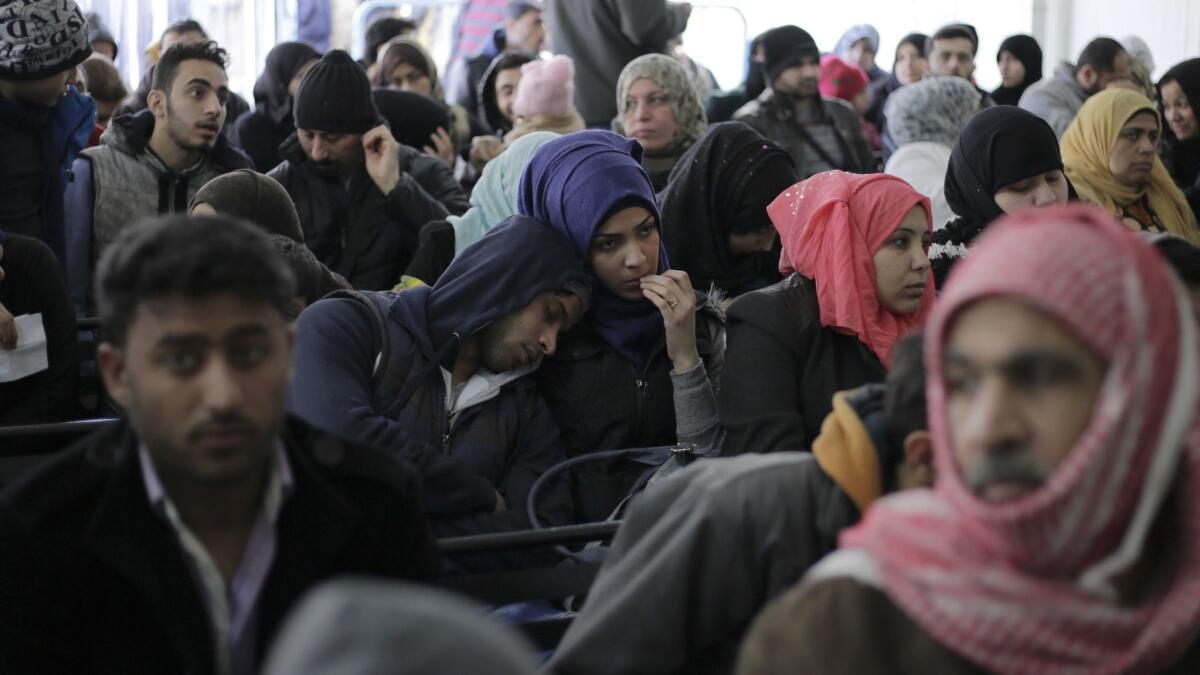White House to drastically cut number of refugees U.S. accepts to 18,000 next year

- Share via
WASHINGTON — Amid what the United Nations says is the largest displacement of people across the globe in modern history, the Trump administration plans to slash the number of refugees the U.S. will accept to 18,000 for 2020, the State Department announced Thursday.
Last year, President Trump capped the total at 30,000 refugees, already one of the lowest levels since the beginning of the U.S. refugee program. By comparison, in President Obama’s last year in office, he set the cap at 110,000 refugees.
The sharp reduction in refugee acceptances is yet another step in the administration’s aggressive drive to reduce even legal immigration to the United States, a pledge on which Trump campaigned in 2016 and one he has renewed in the run-up to his 2020 reelection bid.
“At the core of the Trump Administration’s foreign policy is a commitment to make decisions based on reality, not wishes,” the State Department announcement stated, echoing Trump’s rhetoric at this week’s United Nations General Assembly meeting. “The current burdens on the U.S. immigration system must be alleviated before it is again possible to resettle large number of refugees.”
The administration framed the move as tied to migration to the U.S. southern border, which has seen near-record numbers this year, mostly of Central American families, traveling north and seeking asylum. At the same time, the Trump administration has touted a more than 60% drop in apprehensions at the border in recent months as a result of its deterrence policies, such as forcing nearly 50,000 asylum seekers back to Mexico to await their cases in the United States.
The State Department estimated the U.S. would receive more than 368,000 refugee and asylum claims in fiscal 2020, and would process more than 350,000 individuals in new asylum cases.
Acting Homeland Security Secretary Kevin McAleenan described the proposal as allowing his department “to focus on addressing the ongoing crisis at the southern border” and as supporting recent asylum agreements with the “Northern Triangle” countries of Guatemala, El Salvador and Honduras.
McAleenan signed the deals with El Salvador and Honduras this week. He said the U.S. was giving citizens of these countries “the opportunity to seek refugee status closer to home, rather than embark on a dangerous and often futile journey to the United States in the hands of smugglers and criminal organizations.”
But while few details about the agreements have been publicly released and they have yet to take effect, Homeland Security officials have said they could instead disqualify asylum seekers from claiming protection in the U.S., and force them to be returned to their countries of origin.
The U.S. refugee program is housed at the State Department, not the Homeland Security Department, but the administration has increasingly framed immigration as a Homeland Security issue rather than a foreign policy concern. In U.S. policy, refugees are under a different immigration category than asylum seekers.
Generally, refugee status is obtained outside the country, after an extensive vetting process put in place after the Sept. 11 attacks and beefed up in recent years, whereas U.S. immigration law grants migrants arriving at U.S. borders the right to seek asylum in the United States. The asylum process can also take years.
The proposal on the annual refugee cap is required to be submitted to Congress each year, and the president’s ultimate determination is issued “in consultation with Congress.” In reality, lawmakers do not have much say.
Sen. Dianne Feinstein (D-Calif.) rejected the administration’s proposed refugee cap. “No administration has ever proposed admitting this few refugees,” she said in a statement, adding, “We’re better than that.”
Advocates reacted to the proposal Thursday with alarm. Refugees International President Eric Schwartz called the planned ceiling for 2020 “a sad commentary on American leadership.”
More to Read
Get the L.A. Times Politics newsletter
Deeply reported insights into legislation, politics and policy from Sacramento, Washington and beyond. In your inbox twice per week.
You may occasionally receive promotional content from the Los Angeles Times.











